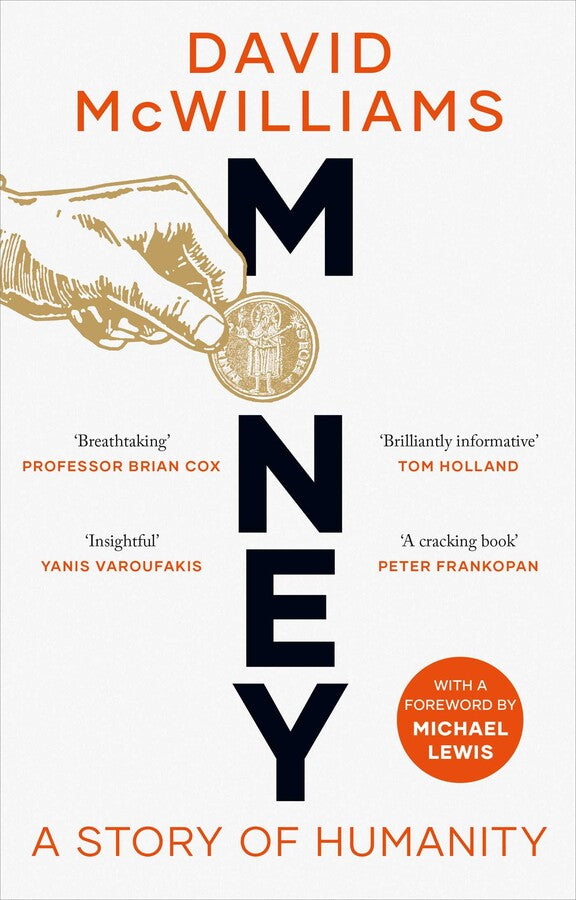David McWilliams
Money
Money
Couldn't load pickup availability
Gabi's Review
David McWilliams’ Money; A Story of Humanity was listed by The Financial Times as their Best Book of the Year - quite the accolade. It’s certainly a captivating and accessible exploration of the history, psychology and societal impact of money. As an economist and storyteller, McWilliams is well positioned to break down complex financial concepts, creating clearly written and witty narratives.
The book focuses on the evolution of money, from ancient barter systems to modern digital currencies. It explores changing technologies that allowed for less friction and greater scalability and accountability, with an emphasis on cultural insights into theories of money, expressed in a colourful pub-chat tone without sacrificing intellectual rigour. McWilliams loves a bubble, greed, fomo and speculation; he doesn’t just explain the nature of money, he applies theory to how it shapes human behaviour, influences power dynamics, and drives global economies. For example, the book explores the collapse of the Roman Empire due to factors such as the devaluation of currency, and the heavy military expenditure and taxation regimes.
McWilliams highlights the French Revolution as a pivotal moment in the evolution of financial instruments, particularly through the introduction of the assignat, a form of paper money backed by confiscated church lands. He describes how this period marked a radical shift toward abstract money, as the revolutionary government, desperate to finance its reforms and wars, issued these notes to replace scarce gold and silver. McWilliams underscores the assignat’s rapid over-issuance, which led to hyperinflation and eroded public trust. This illustrates money’s dual nature as both a facilitator of economic transformation and a trigger for chaos when mismanaged. This episode, he argues, reveals how financial instruments, driven by political necessity, can reshape societal structures while exposing the fragility of faith in paper-based systems. My favourite chapter was ten, titled Invisible Money about the Dutch mercantile empire rewriting the map of the world and a launching a global game of arbitrage.
The author’s dismissal of cryptocurrency as solving “nothing” in Money’s final chapter titled the Evolution of Money, overlooks its groundbreaking ability to equate transaction and settlement rates, a first in financial technology that eliminates delays and reduces intermediary costs. This innovation, exemplified by blockchain’s near-instantaneous settlement, directly addresses inefficiencies in traditional systems. Moreover, his scepticism contradicts the global rise of Central Bank Digital Currencies (CBDCs), with over 100 nations exploring digital currencies built on similar technologies, signalling their transformative potential function as the future of money.
That criticism aside, McWilliams book is highly entertaining as a history; a history he suggests repeats and I would suggest instead, rhymes. While Lyn Alden’s book Broken Money is a more informative linear in-depth technical analysis of financial systems, Money uses a broad-brush approach that makes it an ideal starting point for exploring the forces that govern our financial lives. Whether you’re an economics enthusiast or simply curious about the role money plays in our world, McWilliams’ engaging storytelling will enlighten you on the complexities of finance in relation to cultural practices and human motivations and actions.
Publisher's Review
MONEY.
The object of our desires.
The engine of our genius.
Humanity’s greatest invention.
Whether we like it or not, our world revolves around money, but we rarely stop to think about it. What is money, where does it come from, and can it run out? What is this substance that drives trade, revolutions and discoveries; inspires art, philosophy and science?
In this illuminating, sometimes irreverent, and often surprising journey, economist David McWilliams charts the relationship between humans and money – from a tally stick in ancient Africa to coins in Republican Greece, from mathematics in the medieval Arab world to the French Revolution, and from the emergence of the US dollar right up to today’s cryptocurrency and beyond. Along the way, we meet a host of characters who have innovated with money, disrupting society and changing the way we live, in an ongoing monetary evolution that has, for the last 5000 years, animated human progress.
McWilliams unlocks the mysteries and power of money, explaining why it matters and how it shapes our world. The story of money is the story of earth’s most inventive, destructive, and dangerous animal: Homo sapiens. It is our story.
‘McWilliams has a great knack for bringing a complex economics story to life. He is also funny. In economics, that's a rare and persuasive combination’ Irish Times
Share


